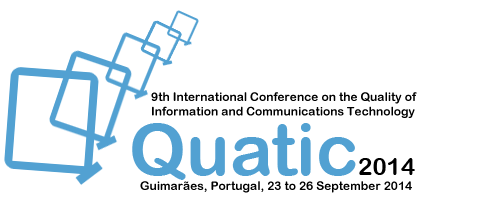Foreword by the ChairDr Marion Lepmets (Dundalk Institute of Technology, Ireland)Service quality is an abstract and elusive construct because of the nature of services – their intangibility, heterogeneity, and inseparability of consumption and production. The growth of IT services in terms of processes, frameworks and standards has been immense. ITIL, ISO/IEC 20000, CoBIT and CMMI-SVC all address service needs. However, this shift to services in IT has not been accompanied by increased understanding of the concepts of quality and of the measurement of quality. This track on the Quality in IT Service Management at the Quatic 2014 Conference is aiming to address this gap by presenting and discussing relevant research about the quality in IT service management. Despite several paper submissions, the rigorous review process resulted in only 2 accepted papers that will be presented today. The Quality in IT Service Management track starts with a keynote addressing the relevance of IT services in today’s IT organizations, not only in solving incidents but also in supporting the decision making in choosing the most efficient path for IT service improvement. The keynote will be jointly presented by Dr Marion Lepmets and Professor Miguel Mira da Silva, the chair and co-chair of this track, respectively. Both papers deal with the challenges that IT organizations face when handling incidents. The first paper is jointly written by Glauber Bezerra, Vladia Pinheiro and Adriano Albuquerque from the University of Fortaleza in Brazil. Their paper “Incident Management Optimization through the Reuse of Experiences and Natural Language Processing “ proposes a systematized incident management process while making use of knowledge engineering approaches like Case Based Reasoning and Natural Language Processing. This paper contributes to IT service management research as it explains how knowledge management can be applied to resolving incidents through a case study in a large IT organization. The second paper entitled “Toward a Gamification Model to Improve IT Service Management Quality on Service Desk” is jointly written by Fabio S. Conceicao, Alan P. Silva, Ananias Q. O. Filho and Reinaldo S. C. Filho from the Federal University of Alagoas in Brazil. Their paper aims to evaluate how persuasive techniques like gamification can motivate and engage service desks to use ITIL, and how feasible the application of such techniques might be. The evaluation is carried out through a survey in a Brazilian public organization’s service desk to understand if gamification improves the motivation and engagement of ITIL best practices in their service desk.
Dr. Marion Lepmets is currently a Senior Research Fellow at the Regulated Software Research Centre in Dundalk Institute of Technology, Ireland. Her postdoctoral research was funded by the National Research Fund of Luxembourg and she conducted it at the Public Research Centre Henri Tudor. Her research focused on evaluating process improvement impact on IT service quality. She has conducted research in process improvement and process assessment since 2000, graduated from Tampere University of Technology (Finland) with Dr. of Technology in 2007, and has been teaching process management courses in both Tallinn University of Technology and Tartu University in Estonia. She is also involved in the development of software engineering standards in the International Standardization Organization (ISO/IEC JTC1 SC7).
Track CommitteeChair: Marion Lepmets, Dundalk Institute of Technology, Ireland Program Committee:
Call for PapersIT services is, most probably, the fastest growing segment of the services economy. Web services, service-oriented architecture, self-service systems and cloud computing all involve a shift to service-centric thinking in computer science and information systems. The growth of IT services in terms of processes, frameworks and standards has been immense. ITIL, ISO/IEC 20000, CoBIT and CMMI all address service needs. However, this shift to services in IT has not been accompanied by increased understanding of the concepts of quality and of the measurement of quality. Efforts have been limited to the implementation of SERVQUAL and asking simple questions of customers when service interactions are completed, yet rigorous measurement of IT service value, although deemed highly important, is still not conducted in most service organizations. Additionally, the interface between software and services, whether through SOA or through traditional software implementation, has hardly been addressed in quality terms. To tackle IT service quality management new thinking is required emerging from academic and industrial experience. The goal of this track is to lay foundations for a radical rethink of IT service quality measurement and monitoring, by drawing in new ideas in quality and critically reviewing existing practice. New metrics may be required. Software quality metrics must be revisited and transformed to encompass service concepts. Service quality must adopt more rigorous approaches which marry with engineering practice. Metrics and monitoring approaches must be evolved. Metamodels, better prediction of quality problems, increased automation, and the generation of quality tools all need attention. We are interested in industry experience, critical analysis of current practice, new theory and ideas, case studies in all areas of IT service quality practice. But also we want to drive forward quality practice at the interface between implementation and support, SOA and ITIL, software requirements and service requirements. This track will bring together researchers from academia and industry interested in meeting the challenges of ITSM. Topics include, but are not limited to:
Paper submissionAuthors should submit to http://www.easychair.org/conferences/?conf=quatic2014 a PDF version of their paper. Papers must be in CPS format and not exceed 6 pages, including figures, references, and appendices. Submissions must be original and will be reviewed by the Track Program Committee. Accepted papers will be be submitted for archiving in Xplore and CSDL, subject to one of the authors registering for the conference. The authors of the 3 best papers of this thematic track will be invited to submit extended versions to the main track of the conference. More info on the QUATIC’2014 selection process and its tracks can be found at http://2014.quatic.org. Important dates |
Tracks > Thematic tracks >













